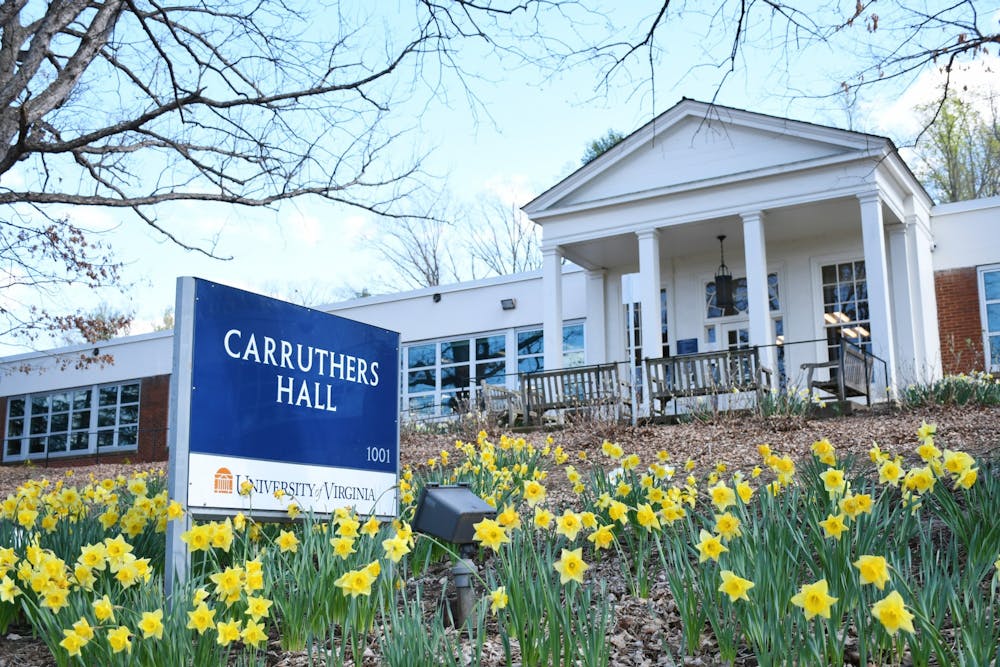Augie Maurelli, former associate vice president for financial operations, said he plans to be a “change leader” as the new Chief Financial Officer. Maurelli further hopes to improve the University by focusing on new financial managing software, safety initiatives and student financial accessibility from an operational perspective.
As CFO, Maurelli plays a critical role in allocating resources to the University’s key initiatives, overseeing the University's budget and working alongside with financial officers at U.Va. Health.
“There's just tremendous opportunities to continue to create value that I absolutely wanted to extend my tenure here and try to be a change leader and a value creator,” Maurelli said.
Maurelli’s appointment comes nearly four years after he accepted the role of associate vice president for financial operations in 2019. Prior to working at the University, Maurelli served as associate vice president for strategy and operations at the University of Delaware, and maintained leadership roles in athletics at Georgetown University. After working as a YoUDee and a Hoya, Maurelli realized nothing beats working as a Wahoo.
However, Maurelli did not initially start off in the world of finance. As a first-generation student, Maurelli attended Johns Hopkins University, where he majored in engineering, and later got his MBA from Georgetown.
Maurelli said that he was always impressed with the University and that conversations with alumni sparked his interest.
“I just feel it’s a great location, rich tradition, a strong commitment towards missions not only in education but in research and patient care as well — it was an absolute no-brainer when the opportunity arose,” Maurelli said.
During his time as CFO, Maurelli said he recognizes the effort needed to deal with more immediate problems, such as the recent uptick in violence on-Grounds and in the Charlottesville community.
Maurelli noted safety measures may redirect funds from other areas of the University’s budget. The Board of Visitors in their most recent meeting discussed implementing safety measures in response to the increase in crime including bolstering the number of ambassadors around grounds and surrounding areas like the Corner, as well as implementing CompStat — a program that uses crime data analysis to predict when and where incidents will occur.
“Resources aren’t unlimited,” Maurelli said. “Budgets are malleable, and when there’s a situation like this where there is consternation around public safety, sometimes resources get redirected.”
Despite these challenges, Maurelli explained that the allocation of financial resources by the University will reflect safety as a top priority.
“When we talked about risk mitigation and realignment of goals, this is a situation where some other things that probably are important may have to slide out… because there’s an immediate need to make sure we’re providing a safe environment,” said Maurelli.
Maurelli said another priority of his is to ensure that the University remains accessible to low-income and first-generation students.
In 2021, the Board of Visitors approved a 3.7 percent increase in tuition for the 2023-2024 academic year, which will affect some students’ abilities to pay for their education Maurelli said that as expenses continue to rise, the University will continue to be one of the only public universities to meet 100 percent of demonstrated need for in-state students.
“We absolutely have to leverage the resources that we have invested, as well as figure out new ways of creating philanthropic incentives to help fuel that engine,” Maurelli said.
In the admission cycle for the Class of 2026, 15 percent of offers went to first-generation students — up from 12.5 percent in the previous cycle. In the most recent admission cycle,1,167 students who were accepted had their application fees waived.
Maurelli said he believes that the University has the groundwork to provide both academic access and affordability, citing initiatives like the Bicentennial scholars fund and AccessUVA– two scholarship programs at the University.
“I believe higher [education] is the leadership platform that will help the next generation and we absolutely need to be doing everything we can to evaluate, create and provide systems that allow things to be affordable and accessible, especially as a state institution,” said Maurelli.
In addition to more immediate challenges, Maurelli also said he is also committed to helping realize University President Jim Ryan’s 2030 Plan– a series of initiatives dedicated to making U.Va the best public university by 2030. Specific goals of the plan include expanding the University’s financial aid program, establishing more residential communities, improving faculty recruitment and establishing the School of Data Science.
Despite the plan being extensive and costly, Maurelli remains optimistic about its implementation.
Maurelli also said that he will work to constantly refine the University's initiatives so that there is a plan for market and more general risks.
“The world is always going to be dynamic and when there's tailwinds, you want to be able to maximize those and take advantage of them,” Maurelli said. “And then when there's headwinds, you want to be able to navigate those and circumvent them to the best of your ability.”
One of his chief concerns as CFO is managing financial enterprise resource planning software — which are designed to help with various aspects of financial planning, including budgeting and predicting financial outcomes. The University made significant investments in ERPs during the pandemic to support administrators in making decisions regarding University operations.
Many other universities have begun to use financial ERPs as they face significant financial pressure due to factors like increasing costs and reduced student enrollment.
Maurelli said he will strive to maximize the benefit of using ERPs in decision-making by providing budget planning and managing debt. He notes the University has already made headway in utilizing the platforms.
“If I want to be successful, that means everyone needs to be successful and the institution needs to be successful,” Maurelli said. “If you put the institution first and you put the collective goals of the enterprise first, ultimately things typically work out”.







